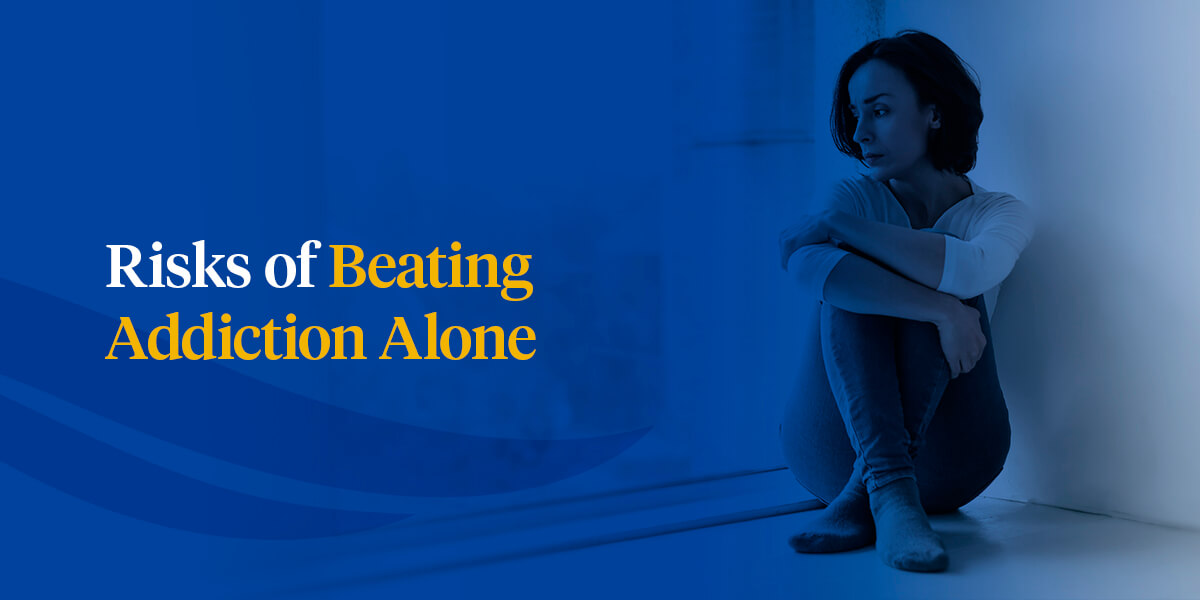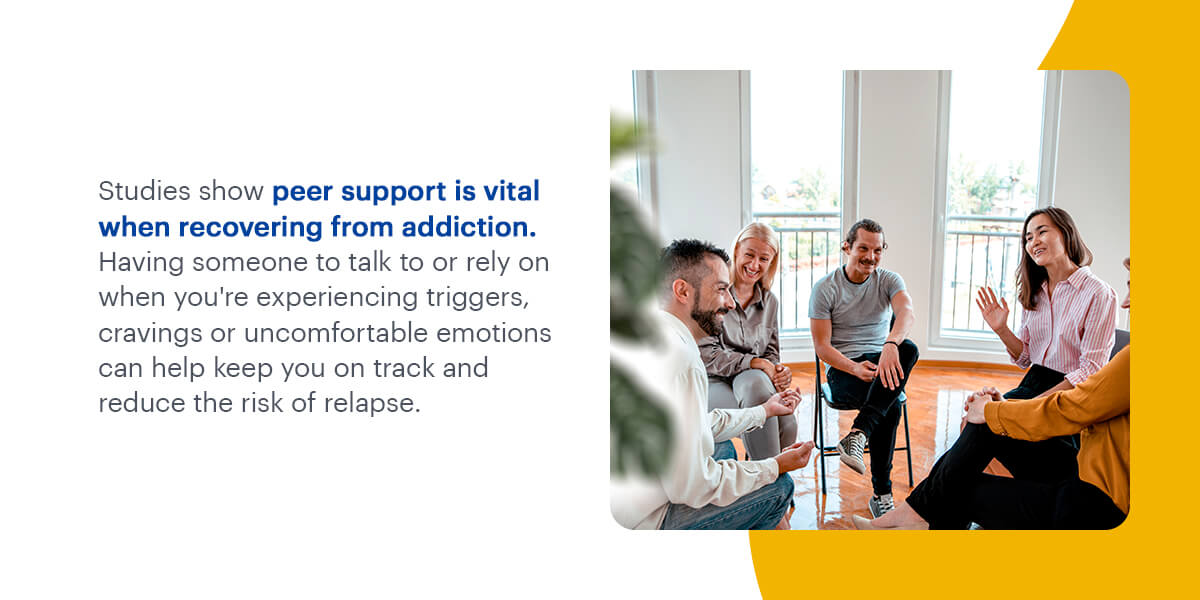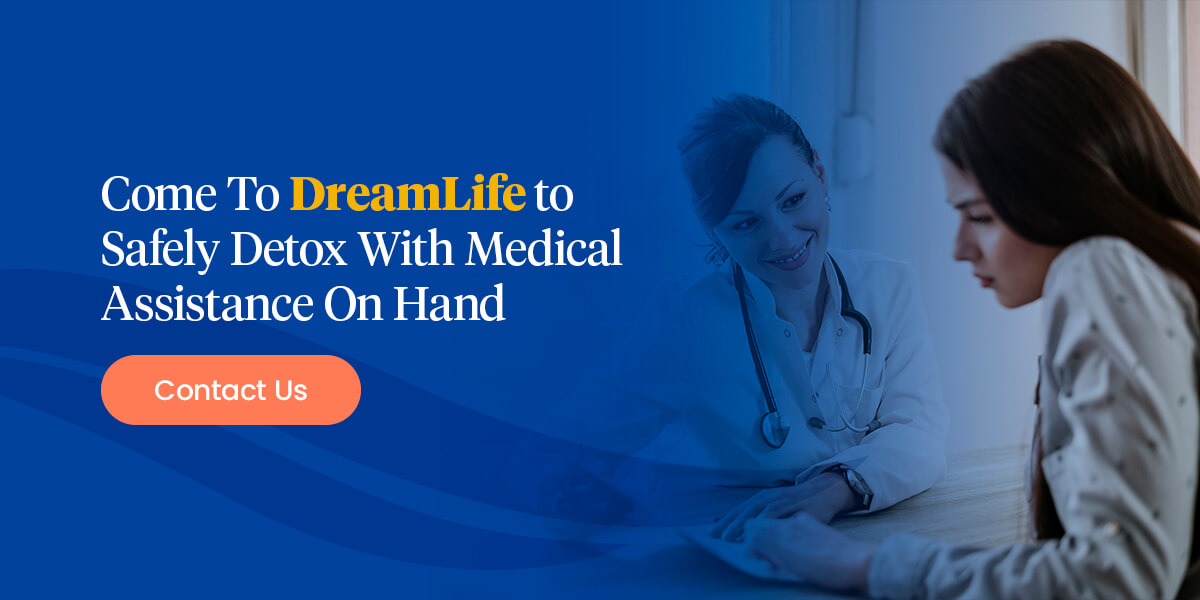Risks of Beating Addiction Alone


Written By
DreamLife RecoveryIf you’re one of the millions of Americans struggling with addiction, you’ve likely experienced dramatic life changes due to substance abuse. You might have experienced new health problems, tension in your relationships, trouble holding down a job or other challenges. Or, maybe you’ve noticed these signs in a loved one who is addicted to alcohol or drugs.
Overcoming addiction can help you or your loved one get life back on track, and it may be tempting to try to quit from the comfort of your home. However, there are risks associated with beating addiction without professional support, and it can be more challenging to find success.
What It’s Like to Try to Break an Addiction Alone
If you’re trying to beat addiction on your own, you’ve likely decided that alcohol or drugs negatively affect your life. However, quitting a substance isn’t as easy as making a decision. It will take hard work, willpower and dedication to overcome addiction, especially when you’re fighting it yourself.
Without professional support, you’ll likely experience many challenges trying to recover from addiction. You’ll have to detox from the substance and completely cut it out of your life. This can be incredibly challenging if you’re constantly surrounded by friends or family members who use substances and bring them into your home. Then, you’ll have to overcome the mental challenges and avoid triggers during the most vulnerable stages of your recovery without support. There are some risks of trying to beat addiction alone.
4 Risks of Breaking an Addiction Alone
If you’re considering fighting addiction alone, it’s essential to be aware of the risks to make the best decision for your physical and mental health. The dangers of fighting substance use disorders alone include:
1. Drug Detox Complications
Fighting addiction on your own is challenging, but it can also be detrimental to your health. When you detox from long-term use of hard substances, such as prescription medications, heroin or meth, you’ll likely experience withdrawal symptoms as the body readjusts and clears the toxins from your body. These withdrawal symptoms can be uncomfortable and painful, making it challenging to quit cold turkey. Facing these symptoms on your own at home will probably make it even more difficult. Some of these symptoms include:
- Muscles aches and pain
- High blood pressure
- Insomnia
- Consistent nausea or vomiting
- Seizures
- Anxiety or depression
- Hallucinations or paranoia
Even minor symptoms — such as vomiting — can be dangerous to your health if you’re not replenishing the lost fluids because you can become severely dehydrated. The intensity of your withdrawal symptoms will depend on the substance used and for how long. Entirely ceasing the use of substances on your own can be dangerous since certain substances can cause life-threatening symptoms while leaving your body.
Even without these symptoms, the discomfort associated with withdrawal can make it challenging to stay committed to sobriety. Some people turn back to substances when the physical and mental withdrawal symptoms become too difficult to handle without support from an addiction specialist.
2. Relapse
Even if you’re able to detox independently, you’ll still have to manage your mental dependence on alcohol or drugs. You may experience depression, anxiety and irritability as your brain gets used to no longer having access to the substance. When you’re trying to overcome addiction at home, you’re likely still around many of the triggers that contributed to your substance abuse in the first place. Some of these triggers include:
- Stress from family, relationships, work or finances.
- Environmental cues, such as a smoking spot or drug paraphernalia.
- Hanging out with friends or family members who use substances.
These triggers can cause cravings — an intense desire to use substances. It can be challenging to overcome your mental and psychological dependence on drugs or alcohol without professional assistance. If cravings get too intense and you haven’t learned the proper coping skills to manage them, you’re at risk for a relapse, which can further damage your physical and mental health. While relapse can happen to anyone, even those who seek professional treatment, the risk increases when you try to break free from addiction independently.
3. Untreated Mental Health Conditions
In many cases, people who struggle with substance use disorder also have a co-occurring mental health condition. These disorders often go hand in hand, and people use substances to treat their mental health symptoms and find relief. For example, a person might drink alcohol to calm their anxiety when they get home at the end of the day. Challenges with mental health can contribute to your addiction, even if you don’t realize it. Some mental health disorders commonly associated with addiction include:
- Depression disorders
- Anxiety disorders
- Post-traumatic stress disorder (PTSD)
- Attention-deficit hyperactivity disorder (ADHD)
- Schizophrenia
- Psychotic disorders
If you’ve used substances to cope with a mental health condition, you may notice your symptoms worsen when you try to quit since you’re receiving no treatment to manage the disorder. Leaving mental health conditions untreated while attempting to break free from addiction on your own can make it more challenging to overcome withdrawal and the mental dependence created by the substance.
4. Lack of Support


Studies show peer support is vital when recovering from addiction. Having someone to talk to or rely on when you’re experiencing triggers, cravings or uncomfortable emotions can help keep you on track and reduce the risk of relapse.
If you fight addiction alone, you won’t have as many people to lean on, and it can be easier to fall back into old habits. Trying to break free from addiction on your own can also be incredibly lonely without an established support group, which is a risk factor for addiction and relapse.
Withdrawal Symptoms That Require Medical Attention
Depending on your substance and the intensity or frequency of use, you may experience withdrawal symptoms that require medical attention. For example, drinking alcohol every day for years and suddenly quitting can cause severe alcohol withdrawal symptoms, such as vomiting and seizures. When you detox from certain substances, you’ll need medical attention to ensure you don’t experience any life-threatening symptoms and so you can get help if you do.
Alcohol and drugs such as heroin or opioids can cause severe side effects when you stop taking them cold turkey after a long period of use. Some of these symptoms include:
- Constant vomiting and dehydration
- Seizures
- Shortness of breath
- Hallucinations
Without the proper care, some of these withdrawal symptoms can be lethal. When you seek treatment at an inpatient rehabilitation center, they’ll prescribe medications to help make the detoxing process more comfortable and monitor you for any concerning symptoms. When you’re under the care of professionals, they can administer the proper care if you start to experience severe withdrawal symptoms. While you may want to try to detox at home, it’s safer to do it in an environment surrounded by medical professionals trained to help you recover from addiction.
Why Choosing a Rehab With Drug Detox Is the Best Route
If you’re struggling with addiction and want to quit, your best option is to choose an inpatient rehabilitation center with a drug detox program. The professional staff at these facilities can monitor you during detox and provide medication to make the withdrawal process more comfortable. You’ll also start therapy to discover and treat the underlying cause of your substance abuse, whether it’s a co-occurring mental health condition, unresolved trauma or stress. A professional will also teach you healthy coping skills to manage triggers, cravings and stress.
At an inpatient facility, you’ll have access to support groups to help you connect with others who share similar experiences. Connecting with others who have gone through addiction can make you feel less isolated in your struggles and help you learn tools to fight back against addiction. When you seek treatment at a professional inpatient facility, your chances of long-term sobriety after treatment are higher than if you tried to quit by yourself.
Come to DreamLife to Safely Detox With Medical Assistance On Hand
If you are struggling with addiction and want to be free, DreamLife can help. Our inpatient detox program can assist you through the first step in recovery. You’ll be monitored by our professional staff at all times and can provide medication as needed to offset the potentially dangerous side effects. During your stay, we’ll provide nutritious meals to help the body heal from substance abuse.
As you detox, you’ll participate in other treatments to help you determine the underlying cause of your addiction. We’ll help you identify your triggers and teach you healthy coping mechanisms to overcome cravings, uncomfortable emotions and life stressors. Contact us today to learn more about our programs and how we can help you reclaim your life.







